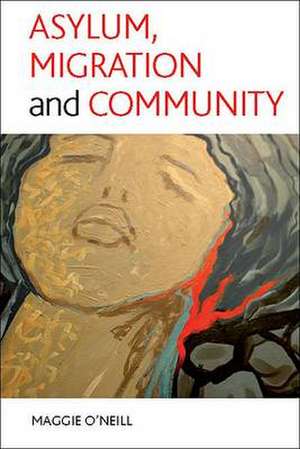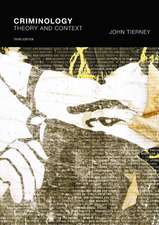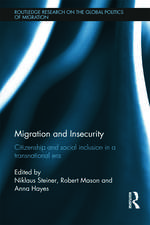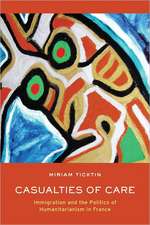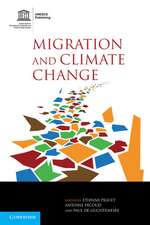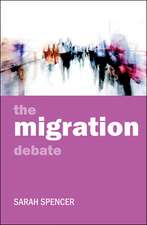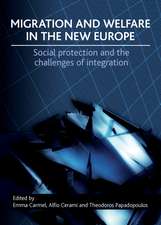Asylum, migration and community
Autor Maggie O'Neillen Limba Engleză Paperback – 16 sep 2010
Issues of asylum, migration, humanitarian protection and integration/belonging are of growing interest beyond the disciplines of refugee studies, migration, and social policy. Rooted in more than two decades of scholarship, this book uses critical social theory and the participatory, biographical and arts-based methods used with asylum seekers, refugees and emerging communities to explore the dynamics of the asylum-migration-community nexus. It argues that interdisciplinary analysis is required to deal with the complexity of the issues involved and offers understanding as praxis (purposeful knowledge), drawing on innovative research that is participatory, arts-based, performative and policy-relevant.
| Toate formatele și edițiile | Preț | Express |
|---|---|---|
| Paperback (1) | 396.63 lei 6-8 săpt. | |
| Bristol University Press – 16 sep 2010 | 396.63 lei 6-8 săpt. | |
| Hardback (1) | 779.43 lei 6-8 săpt. | |
| Bristol University Press – 16 sep 2010 | 779.43 lei 6-8 săpt. |
Preț: 396.63 lei
Nou
Puncte Express: 595
Preț estimativ în valută:
75.90€ • 79.14$ • 63.08£
75.90€ • 79.14$ • 63.08£
Carte tipărită la comandă
Livrare economică 20 martie-03 aprilie
Preluare comenzi: 021 569.72.76
Specificații
ISBN-13: 9781847422224
ISBN-10: 1847422225
Pagini: 312
Dimensiuni: 156 x 234 x 18 mm
Greutate: 0.48 kg
Editura: Bristol University Press
Colecția Policy Press
Locul publicării:United Kingdom
ISBN-10: 1847422225
Pagini: 312
Dimensiuni: 156 x 234 x 18 mm
Greutate: 0.48 kg
Editura: Bristol University Press
Colecția Policy Press
Locul publicării:United Kingdom
Recenzii
Like the asylum seekers and migrants she works with, Maggie O'Neill brings a rich cargo of ideas and images to the terrain she enters, from critical theory and Marxism, to creative and innovative participatory methods. Her book should engage scholars across a wide range of disciplines. Janice Haaken, Professor of Psychology, Portland State University
Maggie O'Neill's book is an essential and superb contribution to refugee and migration studies. It is indispensable reading for those who wish to create global and local communities without humiliation. Evelin G. Lindner, MD, PhDs, Founding President of Human Dignity and Humiliation Studies
Notă biografică
Maggie O'Neill, Department of Social Sciences, Loughborough University
Cuprins
Part one: Globalisation and the asylum-migration-community nexus: Introduction: the asylum-migration-community nexus
Globalisation, humiliation, transnational communities and social justice
Human rights and the law
Part two: Contemporary Theoretical and Methodological approaches: Researching the asylum-migration-community nexus
Re-presenting refugees and asylum seekers in the British media
Diasporic communities and the impact of dispersal: participatory action research and participatory arts
Unaccompanied children and young people
Women Refugees: a safe haven?
Part three: Performative Praxis: Social Policy and the asylum-migration-community nexus: Fortress Europe? Borders, containment and emerging communities
Refused asylum seekers, destitution, poverty and the role of social networks
The Human Dignity and Humiliation Studies (HDHS) global network and the search for social justice
Conclusion: asylum, migration and communities - what next?
Globalisation, humiliation, transnational communities and social justice
Human rights and the law
Part two: Contemporary Theoretical and Methodological approaches: Researching the asylum-migration-community nexus
Re-presenting refugees and asylum seekers in the British media
Diasporic communities and the impact of dispersal: participatory action research and participatory arts
Unaccompanied children and young people
Women Refugees: a safe haven?
Part three: Performative Praxis: Social Policy and the asylum-migration-community nexus: Fortress Europe? Borders, containment and emerging communities
Refused asylum seekers, destitution, poverty and the role of social networks
The Human Dignity and Humiliation Studies (HDHS) global network and the search for social justice
Conclusion: asylum, migration and communities - what next?
